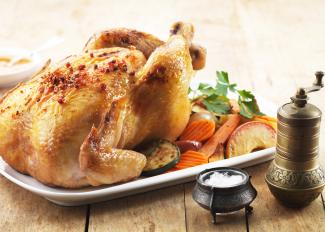
People who eat a high-protein diet during middle age are more likely to die of cancer than those who eat less protein, a new study finds. However, for people older than 65, a moderate protein intake may actually be beneficial, and protect against frailty, the researchers said.
The researchers looked at more than 6,000 people ages 50 and older, and followed them for 18 years. They found that people ages 50 to 65 who ate a diet rich in animal proteins during middle age were more than four times as likely to die of cancer during the study period than those who ate a low-protein diet, according to the study published today (March 4) in the journal Cell Metabolism.
"Popular diets in many cases have high proteins and low sugars. They may make you lose some weight, but that's not a good diet to increase life span," said study researcher Valter Longo, professor of biology at the University of Southern California (USC) and director of the USC Longevity Institute.
The risks of a high-protein diet are even comparable to smoking, the researchers said. People who smoke are four times more likely to die of cancer compared with nonsmokers, Longo said.
"Of course we cannot be sure of the reasons, but we have a pretty good idea, based on this study and also previous studies, as to why this is happening," Longo said.
The study also found that middle-age people who ate foods rich in animal proteins — including meat, milk and cheese — were 75 percent more likely to die of any cause than those who ate a low-protein diet within the study period. [5 Diets That Fight Diseases]
The researchers defined a "high-protein" diet as deriving at least 20 percent of daily calories from protein, a "moderate" protein diet as deriving 10 to 19 percent of calories from protein, and a "low-protein" diet as less than 10 percent of calories from protein.
However, what's bad for people at one age may be healthy at another. In the study, people older than 65 were less likely to die of cancer or other causes if they consumed more protein.
"So, not all people benefit from low protein. Older people actually seem to benefit from moderate intake of protein," Longo said. Having enough protein in the diet may be important for older people to maintain a healthy weight and protect against frailty, the researchers said.
The link between high-protein intake and risk of cancer almost vanished when the researchers considered participants whose protein mainly came from plants, such as beans.
This may be because proteins in plants have a different composition, and don't stimulate growth hormones as efficiently as meat proteins, Longo said.
The study suggests that the Mediterranean diet, which is low in animal protein and high in carbohydrates, may be best for extending life span, Longo said.
The researchers said they recommend eating about 0.8 grams of protein per kilogram of body weight every day in middle age. For example, a 130-pound person should eat about 45 to 50 grams of protein a day, with a preference for plant proteins, the researchers said.
"When you have a lot of protein, these growth factors go up, and we've shown that they help normal cells become cancer-like cells, and then they help the cells grow," Longo said.






